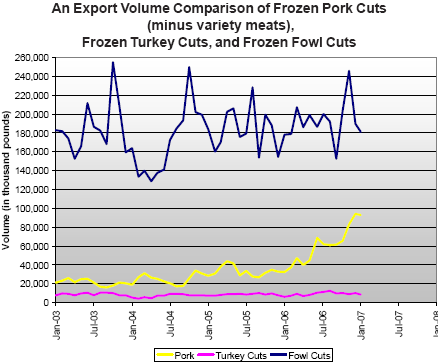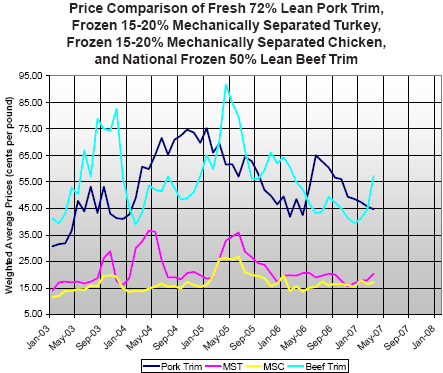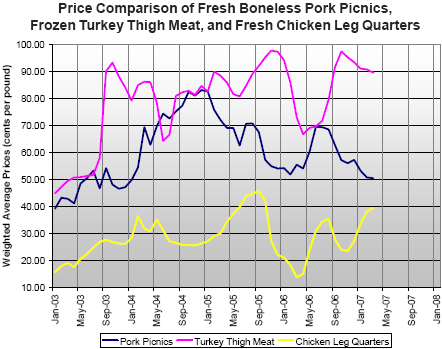



International Egg and Poultry Review
By the USDA's Agricultural Marketing Service - This is a weekly report looking at international developments concerning the poultry industry.Avian Influenza confirmed in U.S.
On Saturday, March 31, 2007 the National Veterinary Services Laboratories confirmed that test results taken on March 30, 2007 from turkeys at a farm in West Virginia were indicative of exposure to an H5N2 avian influenza virus. The laboratories were highly certain it was not he highly pathogenic H5N1 virus that has spread through fowl in Asia. Indications are the virus may be a low pathogenic strain which pose no risk to human health.
The samples were taken from a flock of approximate 25,000 turkeys that showed no signs of illness during routine pre-slaughter surveillance.
The flock was depopulated and the affected producer will receive 100% indemnity for all specified costs associated with depopulation of the flock because of participation in the expanded National Poultry Improvement Plan. Enhanced bio-security measures have also been implemented along with increased surveillance of all flocks within a 6 mile radius. The United States Department of Agriculture policy is to eradicate all H5 and H7 subtypes because of their potential to mutate into highly pathogenic influenza.
As a result of the out break of AI in West Virginia, various countries including Cuba, Hong Kong, Japan (may not apply to dried egg products), Russia, Singapore and Taiwan.
Source: various news sources

Sources: USDA, Foriegn Agriculture Service USDA, AMS, Livestock and Grain Market News

Sources: USDA, AMS, Poultry Market News & Analysis USDA, AMS, Livestock and Grain Market News
South Korea
After almost 10 months of negotiations, the Repubilc of South Korea and the United States (U.S.) signed a free trade agreement (FTA). Under the agreement, over $1 billion worth of U.S. farm exports will become duty-free immediately and most of the remaining tariffs and quotas, including most of poultry, will be phased out over the first 10 years the agreement in force. In 2004, poultry meat had tariffs ranging from 18%-27%. Involved in the negotiations was a bilateral agreement covering items such as meat inspection equivalency and regionalization to name a few.
A hold-up in the approval of the South Korean FTA could be the continued problems with beef imports into South Korea. President George Bush and members of the U.S. Congress have stated that the FTA will not pass the U.S. Congress until South Korea fully opens its beef market. South Korea may begin renegotiating guidelines for importing beef in June once the World Organizational for Animal Health declares U.S. beef is at low risk for mad cow disease which may possibly happen in late May. After the declaration by the World Organizational for Animal Health, some feel South Korea’s beef markets could re-open within 3-4 months thus removing a major stumbling block for the FTA. Some minor issues that may also need to be solved of the FTA include a South Korean project of producing goods in North Korea’s Kaesong industrial complex and Canadian cattle raised in the U.S. for 100 days.
Source: various news sources

Sources: USDA, AMS, Poultry Market News & Analysis USDA, AMS, Livestock and Grain Market News








